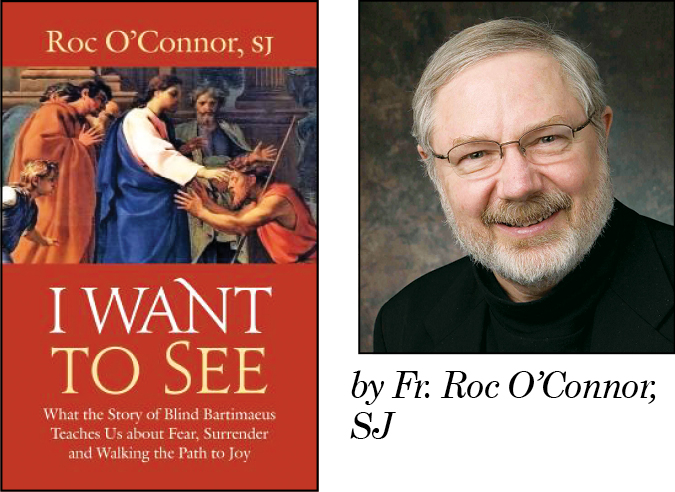“Come and see what God has revealed.” — Fr. Roc O’Connor, SJ, “Lift Up Your Hearts”
The opening paragraph of Fr. Roc O’Connor’s new book, “I Want to See,” wasn’t penned by the Jesuit author, but by the evangelist Mark.
Mark’s brief Gospel story describes Jesus’ healing of Bartimaeus — a fitting beginning for a book subtitled “What the Story of Blind Bartimaeus Teaches Us about Fear, Surrender and Walking the Path to Joy.” An artist’s striking rendition of the healing occupies the space between title and writer’s name on the cover of the 120-page paperback.
There are the sentiments of Fr. Robert O’Connor, now in his second tour of duty as an associate pastor at Milwaukee’s Gesu Church. Born in 1949, the author grew up in Omaha, Nebraska, one of eight children. He attended Jesuit-operated Creighton Prep, Omaha’s Marquette University High School counterpart.
“It was on retreat during senior year,” Fr. Roc recalled, “that I had what I consider a powerful religious experience.” He felt drawn to the priesthood, a vocation he’d occasionally thought about back in grade school. Several months later, after graduation, he was off to the novitiate. He’s been a member of the Society of Jesus for 50 years, an ordained priest for nearly 40.
“I Want to See” is Fr. Roc’s second published book; the first, “In the Midst of Our Storms: Opening Ourselves to Christ in Liturgy,” considers “how the Word proclaimed in liturgical gestures and symbols might help us get in touch with our resistance to God,” he said. One of the St. Louis Jesuits, composers and performers of religious music who’ve been nominated for multiple Grammy Awards, Fr. Roc has also written “about 50 (hymns) that have been published” and is “working on a whole other batch.” (One O’Connor song title instantly recognizable to many Catholic parishioners: “Lift Up Your Hearts.”)
The Jesuit theologian has written “I Want to See” — six chapters, plus introduction and epilogue — in an accessible, conversational style, one that recognizes the dynamism of the present tense. His narrative is interspersed with questions (“Where do you hear prophetic voices today?”; “What do you think of the idea of there being a clash of wills between God and humanity?”), in addition to anecdotes and the aforementioned quotations.
“Blindness,” notes the book’s introduction, “serves here as a metaphor for the all-too-human unwillingness to recognize whatever wound, hurts, and diseases keep us from recognizing God, ourselves, and others. We may someday discover that what we previously judged harshly in our lives and the lives of others are in truth hidden riches. ”
